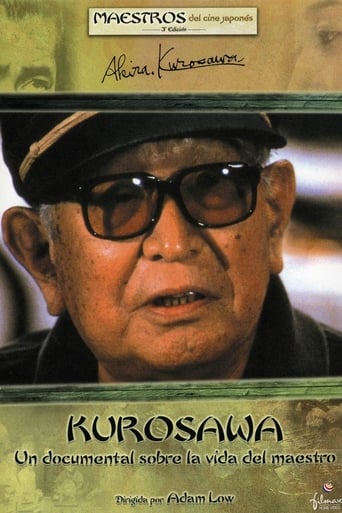Ketrivie
It isn't all that great, actually. Really cheesy and very predicable of how certain scenes are gonna turn play out. However, I guess that's the charm of it all, because I would consider this one of my guilty pleasures.
Helllins
It is both painfully honest and laugh-out-loud funny at the same time.
Kayden
This is a dark and sometimes deeply uncomfortable drama
MisterWhiplash
This is a documentary I've seen a few times, as it is fairly well produced and edited together covering the broad scope of the career (and some parts of the life) of filmmaker Akira Kurosawa. The opening images seem pretty neat, with the Tokyo huge-screen in the city plays the infamous arrow climax from Throne of Blood. But it's mostly just an all-too-short pastiche of interviews and some narration that wavers from being informative or kind of unnecessary, depending on whether it's reading from quotes (this is the part that is the latter). It's probably worth noting that the DVD might hold more interest for those who saw the documentary and felt cheated; there's a trove of interview clips that probably out-time the actually running length of the documentary here. Some of the interviews do come into some good use, like from Kurosawa's own family and from those who are still around to kick some small anecdotes or notes of praise. Even Clint Eastood and James Coburn give their dues for some of the pivotal inspirations for their own careers. It's a fitting TV documentary that puts the important bits from Kurosawa's autobiography up-front (i.e. the earthquake in the 20s, the suicide attempt, pretty much all the major works noted to greater or lesser degrees depending on their notoriety). That it isn't the ultimate testament to the director is a letdown, as the more informative, enlightening looks at his work and life can be seen in Stuart Galbraith and Donald Richies books.
mugczar
this dvd-ography strikes me as something of a "one-timer"; that is, once you've seen it, there's no reason to see it ever again. in fact, if you've seen more than a few kurosawa films, once might be too many.but used as an introduction to the filmmaker, "kurosawa" is worth watching, if you can look past editing techniques adam low and david kitson must have believed were clever, since they were (over)used throughout the piece. the main offender was the use of black and white footage, shot to try to emulate the look of kurosawa's films. however, it takes more than just switching to "BW" on your handycam to pull that off.the other one that really stuck out in a long, painful-to-watch kind of way, was at the end (spoiler?) at the site of kurosawa's grave, from which smoke emanates. the editor reversed a slow zoom out to give the effect of zooming in on smoke *returning* to the grave. it must have lasted five minutes.again, if you can look past these and are wondering what the deal is with all the hype about kurosawa, this is a wonderful place to find out.
tedg
Spoilers herein.I'm skeptical of projects like this. A great artist is no more defined than that his work stands on its own. Kurosawa's work does. He is one of less than a half dozen people who invented film and thereby changed the way we dream.I believe in biographies of historical characters, because a convincing case can be made for history as a collection of human actions, not ideas. So it makes sense to understand some of those people in some way. But art is different. Different enough that if we talk about the life, it has to be the life of ideas.Pollock was a drunk. So what? The recent film of his life reduced his work to an unexplained obsession. What's interesting and important with that?Anyway, the rationale behind these projects, this one surely, is an appreciation of a life, despite the repeated information that he was all film and nothing else. We do get snippets of some work, but largely wrapped around some fact: his difficulties with management, his financing, the hotel room he used when writing the script. A huge `discovery' is presented when explaining that a childhood expedition to see corpses from the great earthquake is reflected in later films. Some lip service is given to his intensity and commitment. But nowhere can we find something about his ideas of visual grammar. We don't get any insight into the subjectivization of the camera, the revolution he wrought.I'm sure that this was financed with school libraries in mind, so they dumbed it down to match TeeVee notions of what biographies are all about. But I am also sure that this master would rather see a film about him, centered on the work and with no dialog at all. None, even words as well intoned as those by Shepard and Scofield.
brickwall
I saw this on PBS' Great Performances. This documentary is about film genius Akira Kurosawa. The documentary charts Akira Kurosawa's early life in pre-WWII Japan to the end of his life. Kurosawa brought Japanese cinema to a world wide audience. I recommend "Kurosawa" for anyone who is an Akira Kurosawa fan.

